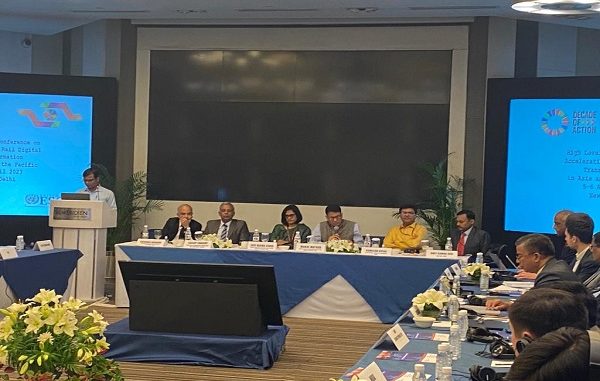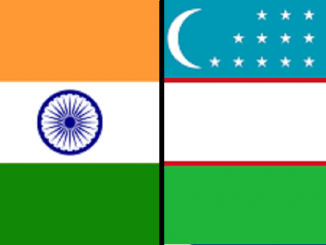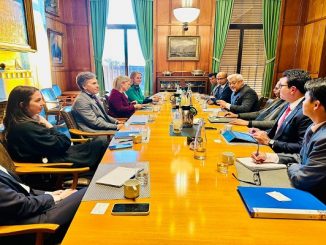
Apr 08: A High-Level Conference on Accelerating Rail Digital Transformation in Asia and the Pacific region was held in New Delhi, India on 5 and 6 April 2023. The Conference was organized by United Nations Economic and Social Commission for Asia and the Pacific (ESCAP) in collaboration with the Ministry of Railways.
The Conference was attended by the representatives of the Ministries of Transport/Railways of 18 countries including Armenia, Azerbaijan, Bangladesh, Cambodia, Georgia, India, the Islamic Republic of Iran, Kazakhstan, Kyrgyzstan (online), Lao People’s Democratic Republic, Nepal, Russian Federation, Sri Lanka, Tajikistan, Thailand, Uzbekistan (online) and Viet Nam.
Representatives from the Asian Institute of Transport Development, Birmingham Center for Railway Research and Education, the Organization for Cooperation Between Railways, the International Union of Railways and International Organization for International Carriage by Rail also participated in the Conference.
Addressing the Conference, the Chairman of Indian Railways Mr Anil Kumar Lahoti lauded ESCAP for organizing the Conference on a very topical issue and inform the participants that Indian Railways is expanding its digital footprints in every aspect of rail transport and is ready to share its experience and expertise with the member of the Trans-Asian railway network and especially with those countries that are starting their rail digitalization journey.
The trans-Asian railway network provides a coordinated plan for developing a regional rail network to support intra and inter-regional trade and transport. The 128,000-kilometer-long rail network passes through 28 countries and was formalized through an Inter-governmental Agreement on the Trans-Asian Railway network that entered into force in 2009.
The Head of the UN ESCAP office in New Delhi Ms Mikiko Tanaka also addressed the participants, emphasizing the need to leverage digitalization to further augment the operational performance of rail and increase freight and passenger transport by rail to support countries in the realization of sustainable development goals.
The Conference deliberated on ways and means to accelerate rail digital transformation in Asia and the Pacific to enhance the competitiveness of rail transport to attract more freight and passenger to railway transport. The participating countries deliberated on a regional strategy for accelerating rail digital transformation in Asia and the Pacific that was presented by Mr Sandeep Raj Jain, an official from the Transport Division of the UN ESCAP head office in Thailand.
The proposed strategy aims to provide coherence and momentum to current initiatives on rail digitalization; foster an ecosystem to harness the full potential of rail digitalization; augment the operational performance, capacity, reliability, safety, and security of rail assets; enhance customer experience including ease of doing business; create synergies through partnerships to digitalize rail; and ensure high-level political support on rail digitalization. It further identifies eight priority areas and five cross-cutting issues to deepen regional cooperation on accelerating rail digital transformation.
Among the cross-cutting issues, the strategy proposes to set up a regional capacity-building programme on rail digital transformation with a pool of experts to enhance the digital skills of railway officials. For financing rail digital projects, the strategy suggests countries establish a rail digital and innovation fund as a multi-donor trust fund to support landlocked and least developing countries to leapfrog to digital technologies.
On strengthening rail cybersecurity, it advocates developing a regional framework for rail cybersecurity for sharing of information, capacity building and learning from experience. The strategy also aims to heighten engagement with the private sector by encouraging countries to support legal and regulatory frameworks that attract private investments and expertise in rail digital applications.
The proposed strategy also provides for implementation arrangements with suggestions to formulate national and sub-regional strategies on rail digitalization and measuring progress through developing a rail digital and innovation index complemented by three levels of maturity for rail digitalization.
The Conference participants welcomed the draft strategy on accelerating rail digital transformation presented by the ESCAP secretariat and underlined that it’s adoption and subsequent implementation can fast-track rail digitalization, particularly, for landlocked and least developing countries of the region.
Ms Jaya Varma Sinha, Member Operations and Business Development of Railway Board in her welcome address on the second day of the Conference also strongly supported the proposed draft of the regional strategy and informed the Conference on the willingness of the Indian railways to support regional rail digitalization initiatives through a platform provided by ESCAP.
The two-day Conference ended with a recommendation to adopt the regional strategy of accelerating rail digital transformation by the members of the Trans-Asian Railway network.



